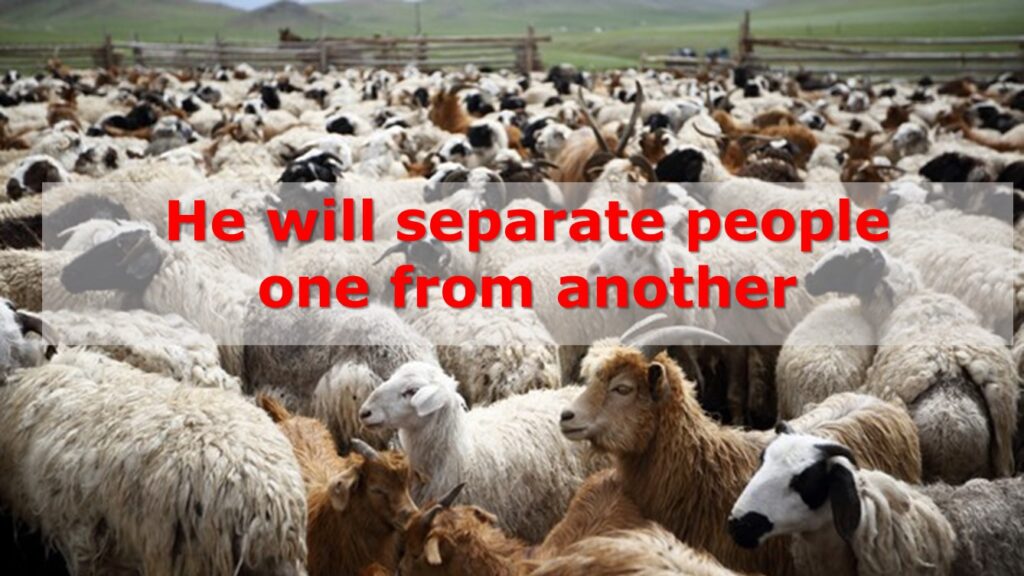This Sunday the lectionary invites us to ponder Matthew 25:31-46. The English Standard Version (ESV) titles it “The Final Judgment.” In Matthew’s gospel, it’s the last parable Jesus told in his last speech before his arrest, trials, judgments, and crucifixion. Here’s a quick summary:
Jesus refers to himself as the Son of Man, and as King.[1] He says he will return, “in glory,” with “all the angels;” he will gather “all the nations;” he will separate the people from one another, like a shepherd separates sheep from goats.
Sheep will “inherit the kingdom prepared [for them] from the foundation of the world.” Goats will be sent “into the eternal fire prepared for the devil and his angels.”
Jesus says the sheep are “righteous,” but don’t know it. He says he’ll know who’s righteous, and who’s not, by how they responded to “the least of these my brothers.”
Whether our lives end in “eternal life,” or in “eternal punishment,” is decided by how we respond to the needy: “For I was hungry and you gave me food, I was thirsty and you gave me drink, I was a stranger and you welcomed me, I was naked and you clothed me, I was sick and you visited me, I was in prison and you came to me.”[2]
It’s hard to argue with the title “The Final Judgment” which the ESV chose for the passage. But as in every story that Jesus told, there’s a twist. The twist made one commentator say it’s a disturbing parable.
It’s disturbing because of our understanding of sin and salvation. Our understanding is that we are “saved” from a daily sense of failure and futility, and from final dismay, not by our “works,”[3] but by Jesus’ death.
We can easily misread this parable. We can misread it by concluding that we can change our eternal destination by deciding to be more caring, more generous. Why would such a reading be a misreading?
It would be a misreading because the parable says the righteous, the ones who serve the marginalized, desperate, needy, don’t even know they’re righteous. And it says those who are served are Jesus’ brothers. Are the “brothers” all who are needy, or are they Jesus’ disciples?
They could be Jesus’ disciples. Why? There are at least three reasons.
First, because Matthew uses “brothers” (12:49; 28:10) and “little ones” (10:42; 18:6, 10, 14) to refer to Jesus’ disciples; second, because Matthew says Jesus taught that receiving his disciples is the same as receiving him (10:40-42); and third, because identifying “brothers” as “disciples” avoids suggesting salvation by works.[4]
Some have pointed out there’s a problem with identifying “brothers” as disciples. This is how bible scholar Klyne Snodgrass puts it:
[There is no] evidence elsewhere that Matthew or Jesus thought entrance to the kingdom could be obtained merely by being nice to missionaries, regardless of theology and conduct.
So much for who the “brothers” are. Now we ask, “Why does Jesus speaks of kindness to ‘the least’ of them?” Why “the least”?
I think of an episode in The Railway Men,[5] a television series which I watched recently.
The setting is a railway station. The Station Master has received a tip that the General Manager (GM) will soon arrive to conduct a surprise inspection. He directs all his staff to drop all routine work and work only on finding out when the GM will arrive. He refuses to respond to any requests his staff put to him which do not relate to the GM’s whereabouts.
Unknown to the Station Master, the GM has been present all along, in the form of a customer who seeks help to find his lost luggage. After some time, the “customer” reveals himself to be the GM. You can imagine the shock of the Station Manager.
The point is this: The way we respond to powerful or famous persons is as automatic as how we respond to poor, hungry, thirsty persons, or prisoners awaiting trial or serving time. If we are “righteous,” our automatic response will be the same, regardless of the person’s status. Because it’s automatic, we won’t even know our response is the same.
The parable warns us that the ones who automatically, sub-consciously, care for everyone are the ones God approves. The test is the way we treat those who are needy and unimportant. Everyone will be tested. Everyone who fails the test will be denied citizenship in Jesus’ kingdom.
He will separate people one from another. The need for salvation is real. Salvation is not by works. Salvation is also not without works.
Peace be with you.
[1] This is the only place in the Bible where Jesus refers to himself as king.
[2] This series occurs, with minor variations, four times in the passage.
[3] Work includes even our worship and our service to others.
[4] Bible scholar Craig Keener says, “That the ‘siblings’ are here ‘disciples’ is the majority view in church history and among contemporary New Testament scholars, although those who hold “siblings” to be disciples divide sharply over whether they are specifically missionaries or poor fellow disciples in general.” (1999)
[5] It tells of how, in 1984, in Bhopal, India, railwaymen saved thousands of lives during the Union Carbide gas leak disaster.
To learn more about Rama, click here.



Pingback: The fig tree is not a footballers’ clock – Bangsar Lutheran Church
Pingback: The gospel of Jesus Christ, the Son of God – Bangsar Lutheran Church